外研版(2019) 必修 第一册 Unit 3 Family matters Using language课件(共31张PPT,内嵌音频)
文档属性
| 名称 | 外研版(2019) 必修 第一册 Unit 3 Family matters Using language课件(共31张PPT,内嵌音频) | 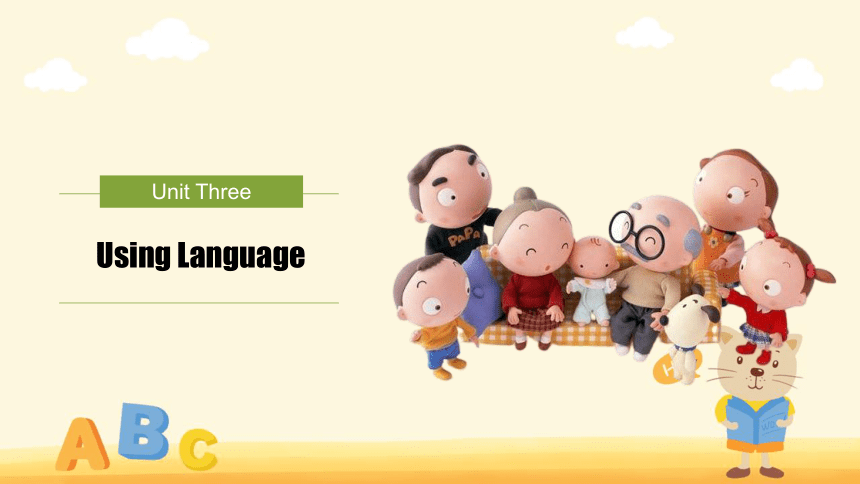 | |
| 格式 | pptx | ||
| 文件大小 | 6.0MB | ||
| 资源类型 | 教案 | ||
| 版本资源 | 外研版(2019) | ||
| 科目 | 英语 | ||
| 更新时间 | 2023-10-09 20:30:30 | ||
图片预览

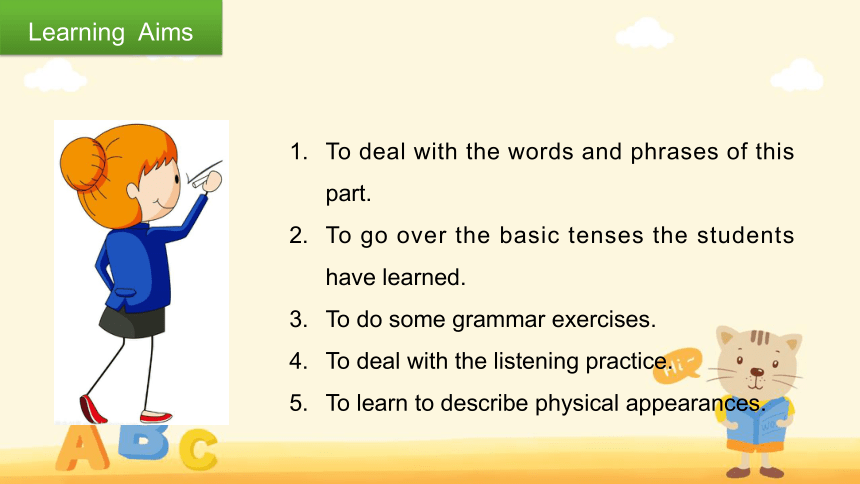
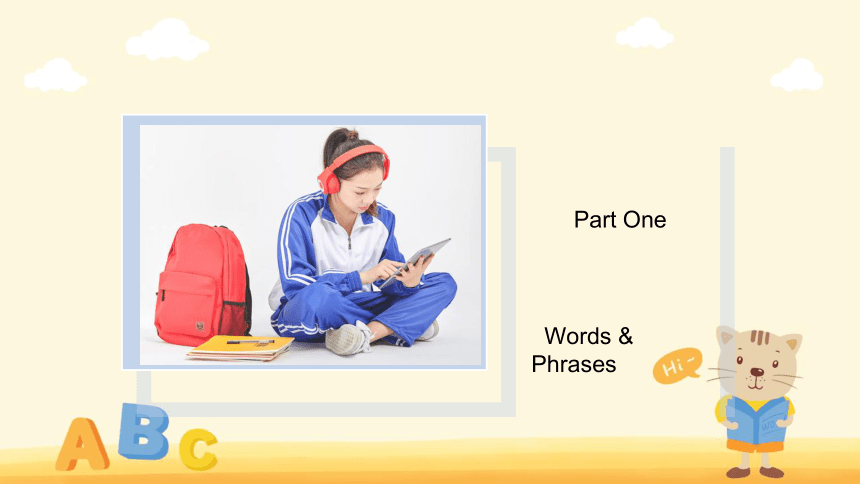
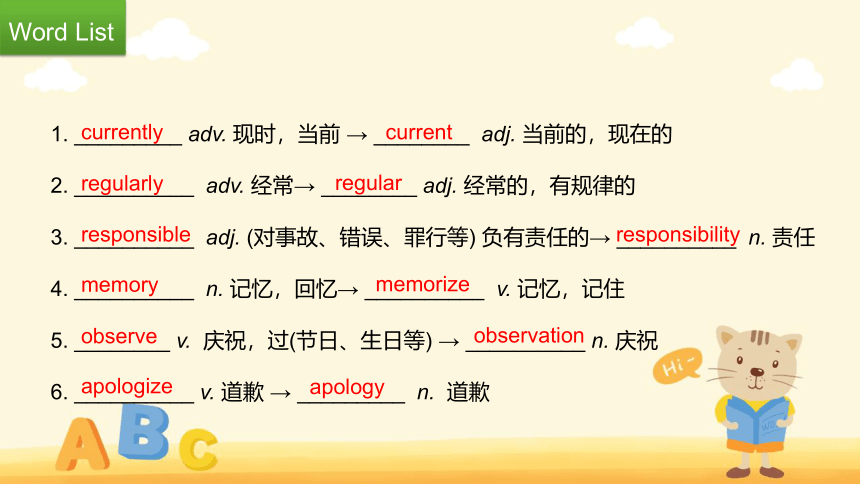
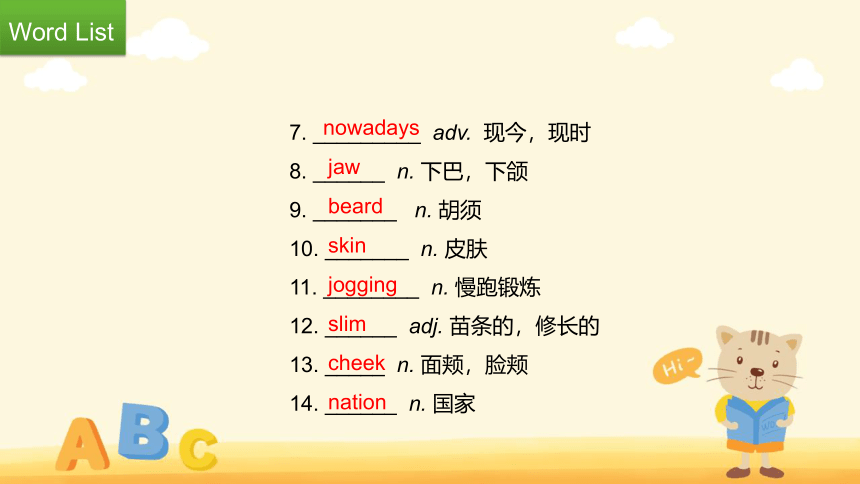
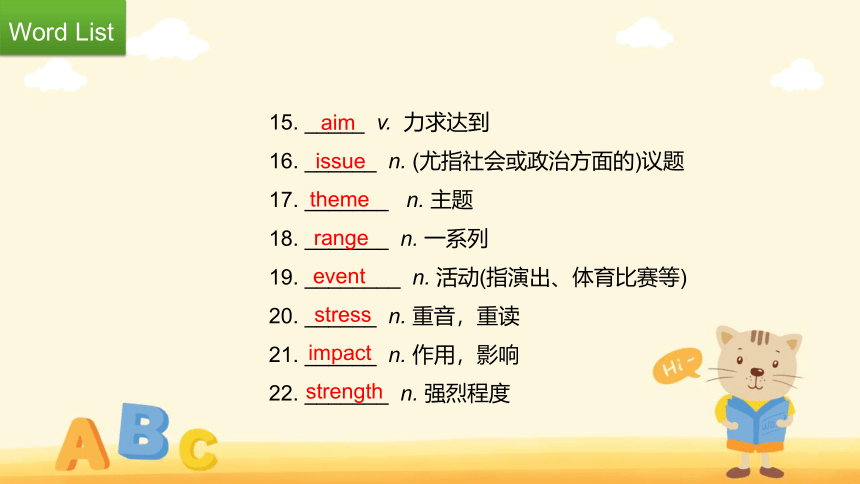
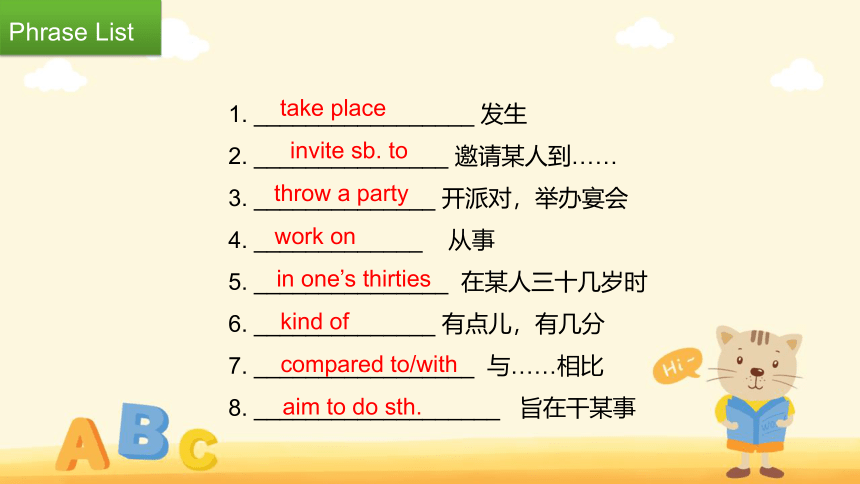

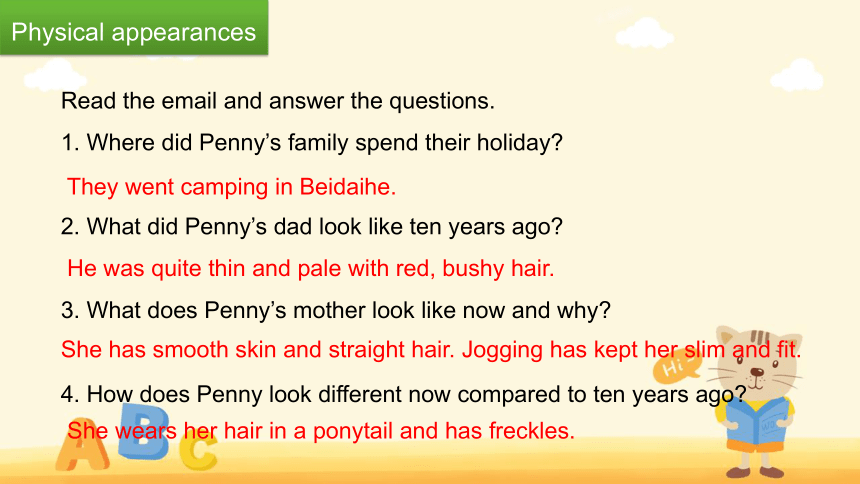
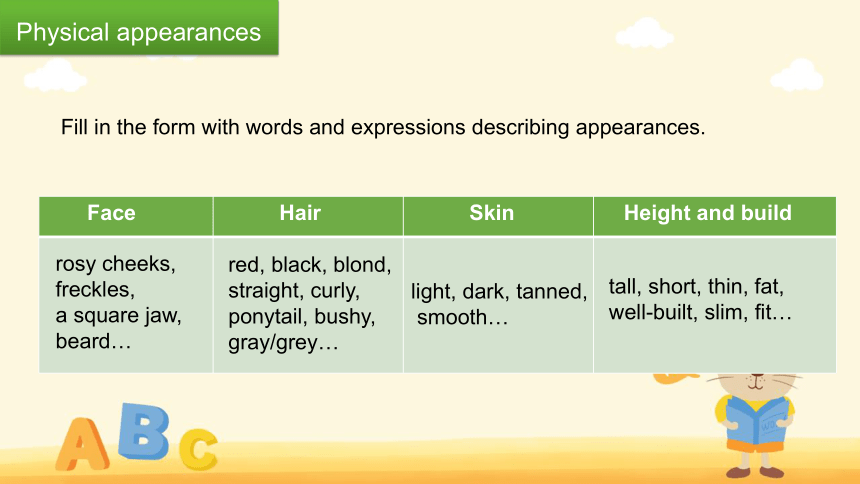
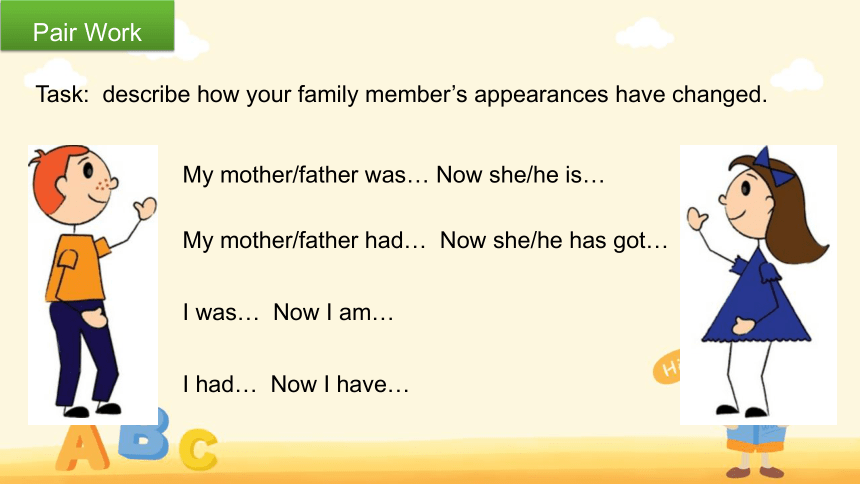
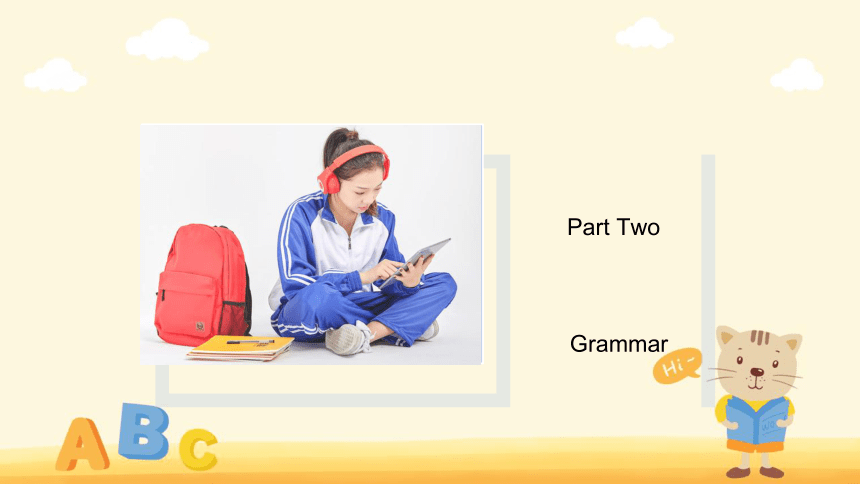
文档简介
(共31张PPT)
Unit Three
Using Language
Learning Aims
To deal with the words and phrases of this part.
To go over the basic tenses the students have learned.
To do some grammar exercises.
To deal with the listening practice.
To learn to describe physical appearances.
1. _________ adv. 现时,当前 → ________ adj. 当前的,现在的
2. __________ adv. 经常→ ________ adj. 经常的,有规律的
3. __________ adj. (对事故、错误、罪行等) 负有责任的→ __________ n. 责任
4. __________ n. 记忆,回忆→ __________ v. 记忆,记住
5. ________ v. 庆祝,过(节日、生日等) → __________ n. 庆祝
6. __________ v. 道歉 → _________ n. 道歉
currently
current
regularly
regular
responsible
responsibility
memory
memorize
observe
observation
apologize
apology
Word List
7. _________ adv. 现今,现时
8. ______ n. 下巴,下颌
9. _______ n. 胡须
10. _______ n. 皮肤
11. ________ n. 慢跑锻炼
12. ______ adj. 苗条的,修长的
13. _____ n. 面颊,脸颊
14. ______ n. 国家
jogging
slim
cheek
nation
nowadays
jaw
beard
skin
Word List
Word List
15. _____ v. 力求达到
16. ______ n. (尤指社会或政治方面的)议题
17. _______ n. 主题
18. _______ n. 一系列
19. ________ n. 活动(指演出、体育比赛等)
20. ______ n. 重音,重读
21. ______ n. 作用,影响
22. _______ n. 强烈程度
event
stress
impact
strength
aim
issue
theme
range
1. _________________ 发生
2. _______________ 邀请某人到……
3. ______________ 开派对,举办宴会
4. _____________ 从事
5. _______________ 在某人三十几岁时
6. ______________ 有点儿,有几分
7. _________________ 与……相比
8. ___________________ 旨在干某事
take place
throw a party
work on
in one’s thirties
compared to/with
aim to do sth.
invite sb. to
kind of
Phrase List
9. ____________ 与……有关
10. _____________大范围的,广泛的
11. ______________ 忙于……
12. ______________ 为……担忧
13. _______________ 弥补
14. _____________ 去露营
15. ______________ 更重要的是
16._________________ 对……有很大影响
17. _______________ 盼望;期待
be related to
be busy with
make up for
most importantly
look forward to
have a big impact on
a wide range of
be worried about
go camping
Phrase List
Read the email and answer the questions.
1. Where did Penny’s family spend their holiday
2. What did Penny’s dad look like ten years ago
3. What does Penny’s mother look like now and why
4. How does Penny look different now compared to ten years ago
Physical appearances
They went camping in Beidaihe.
He was quite thin and pale with red, bushy hair.
She has smooth skin and straight hair. Jogging has kept her slim and fit.
She wears her hair in a ponytail and has freckles.
Face Hair Skin Height and build
Fill in the form with words and expressions describing appearances.
Physical appearances
rosy cheeks,
freckles,
a square jaw,
beard…
red, black, blond,
straight, curly,
ponytail, bushy,
gray/grey…
light, dark, tanned,
smooth…
tall, short, thin, fat,
well-built, slim, fit…
Task: describe how your family member’s appearances have changed.
My mother/father had… Now she/he has got…
I was… Now I am…
Pair Work
My mother/father was… Now she/he is…
I had… Now I have…
思考:初中阶段,同学们主要学习了哪五种时态?
一般过去时 the past tense
一般将来时 the future tense
Grammar
一般现在时 the present tense
现在进行时 the present continuous tense
现在完成时 the present perfect tense
一般现在时
构成:动词原形(注意主语是第三人称单数时动词的变化)
写出下列动词的变化:
talk_______ play________ snow________ wash________ watch________ go________ guess________ fix________ say_________ carry ________
talks
plays
snows
washes
watches
goes
guesses
fixes
says
carries
Grammar
用法:
1)表示经常性、习惯性的动作或状态。常与表示频度的时间状语连用,如always, usually, often, frequently, sometimes, seldom, every day, now and then等。
每天早晨八点钟开始上课。 ________________________________
2)表示现在的状态、特征、能力、性格、个性等。
她喜欢听音乐。 ______________________________
3)客观事实、普遍真理、格言警句。
众所周知,地球绕着太阳转。 _______________________________________________
Class begins at eight every morning.
She is fond of listening to music.
As is known to us all, the earth travels around the sun.
Grammar
※特殊用法:表示将来。
4)按时间表将要发生的动作。常限于表示位移的动词,如go, come, leave, start, begin, arrive, take off等。
飞机将在八点起飞,十一点到北京。
___________________________________________________
5)在时间和条件状语从句中,常用一般现在时代替一般将来时。
如果明天下雨的话我们将推迟会议。__________________________________________
The plane takes off at eight and arrives in Beijing at eleven.
We will put off the meeting if it rains tomorrow.
Grammar
现在进行时
构成:am/is/are+动词的现在分词
写出下列动词的现在分词形式:
prefer _________ begin _________ run _________ forget __________
lie __________ stay _________ confuse ________ offer ___________
preferring beginning running forgetting
lying staying confusing offering
Grammar
用法:
1)表示说话时正在进行的动作。
现在我们正在上英语课。
________________________________
2)表示目前一段时间内正在进行的动作。(而此时不一定正在进行)
这些天他正在写一本书。
___________________________
We are having an English lesson now.
He is writing a book these days.
Grammar
3)与always, constantly(不断地), frequently等副词连用,表示某种强烈的感彩(赞扬、厌恶、埋怨等),并不强调动作正在进行。
她总是帮助别人。(赞扬)
___________________________
特殊用法:表示将要发生的动作。
4)表示按计划或安排将要发生的动作。常与表示位移的动词如go, come, leave, start, arrive, take off等连用。
飞机就要起飞了。
_____________________
She is always helping others.
The plane is taking off.
Grammar
现在完成时
构成:have/has+动词的过去分词
用法:
1)过去发生或已完成的某一动作对现在的影响或结果。
我刚刚把灯关上了。
__________________________
2)过去某一动作持续到现在,有可能持续下去。常见的时间状语有so far, up to now, till now, to date, in/over/during + the past/last + 时间段。
Over the past ten years, Tom _____________(attend) seven meetings.
I have just turned off the light.
has attended
Grammar
3)常用句型
① It is/has been + 一段时间 + since…
It ___________(be) six months since we last saw each other.
② It/That/This is the first/second…time (that) sb. have/has done
It is the first time that I ___________(see) the night face to face.
③ It/That/This + 最高级+ 名词 + that sb. have/has done
This is the best film that I ___________(see).
is/has been
have seen
have seen
Grammar
一般过去时
构成:谓语动词用过去式表示
用法:
1)表示过去某个特定的时间发生的动作或存在的状态。
He __________(offer) his seat to an old man.
2)表示过去某一段时间内经常性或习惯性的动作。
When I lived in Shanghai, I often _________(take) a walk in the street.
3)在时间和条件状语从句中代替过去将来时。
They said they would let us know if they _________(hear) any news about him.
offered
took
heard
Grammar
辨析比较:现在完成时与一般过去时
______________________________________________________________
______________________________________________________________
He __________(give) up smoking, but one year ago he ________(smoke) 60 cigarettes a week.
一般过去时只表示动作发生在过去,与现在无关;而现在完成时强调的是过去发生的动作对现在造成的影响或产生的结果。
has given
smoked
Grammar
一般将来时 构成:will + 动词原形; be going to + 动词原形
用法:
1)will + 动词原形
①表达单纯的将来,没有主观因素。
春天到了天会变暖。 _________________________________
②表倾向性或习惯性的动作。
他每次来北京都会去参观长城。
_____________________________________________
③表示说话人临时作出的决定。
—Mr. Wang is ill in hospital. —Oh, I _________(go) and see him.
It will become warm when spring comes.
Each time he comes to Beijing, he’ll visit the Great Wall.
will go
Grammar
2)be going to + 动词原形
①表示打算、计划、安排要做某事。
你寒假期间打算做什么? __________________________________________
②有迹象表明要发生的事。(常指自然现象)
Look! It is going to rain. You’d better take an umbrella with you.
What are you going to do during the winter holiday
Grammar
3.其他表达
1)be to do
①表示按计划或安排将要发生的动作。
他们将在学校门口见面。 ____________________________________
②按职责、要求、义务等将要发生的动作。
未经允许,任何人不得离开这个房间。__________________________________________
③表示注定要发生的事情。
你的计划注定要失败。 Your plan is to be a failure.
They are to meet at the gate of the school.
No one is to leave the room without permission.
Grammar
2)be about to + 动词原形
表示就要/正要做,常用于 “ be about to do…when…” 句型。
我刚要上床,这时电话响了。________________________________________
I was about to go to bed when the phone rang.
Grammar
Xiao Ming is very excited today, because his parents 1__________(be) back from America. This is the first time that he 2_________(be) away from his family for such a long time. They 3_________(phone) him yesterday and said, “ We 4_________(leave) for the airport at four o’clock, because the plane 5_________(take) off at six. Are you 6_________(come) to the airport to meet us ” “Of course,” he said. Just now he as well as his grandpa 7_________(be) going to meet his parents at the airport. They were about 8________(lock) the door when the phone 9_________(ring). It was Xiao Ming’s parents. “We 10_________(arrive) home in half an hour.” What a great surprise!
will be
has been
phoned
are leaving
takes
coming
was
to lock
rang
will arrive
Grammar
Listen and choose the feelings
that the speakers express.
√
√
√
Listening
Listen again and
complete Alice’s
journal entry.
school play
off sick
tired and pale
relax
countryside
picnic
catch up
Listening
Unit Three
Using Language
Learning Aims
To deal with the words and phrases of this part.
To go over the basic tenses the students have learned.
To do some grammar exercises.
To deal with the listening practice.
To learn to describe physical appearances.
1. _________ adv. 现时,当前 → ________ adj. 当前的,现在的
2. __________ adv. 经常→ ________ adj. 经常的,有规律的
3. __________ adj. (对事故、错误、罪行等) 负有责任的→ __________ n. 责任
4. __________ n. 记忆,回忆→ __________ v. 记忆,记住
5. ________ v. 庆祝,过(节日、生日等) → __________ n. 庆祝
6. __________ v. 道歉 → _________ n. 道歉
currently
current
regularly
regular
responsible
responsibility
memory
memorize
observe
observation
apologize
apology
Word List
7. _________ adv. 现今,现时
8. ______ n. 下巴,下颌
9. _______ n. 胡须
10. _______ n. 皮肤
11. ________ n. 慢跑锻炼
12. ______ adj. 苗条的,修长的
13. _____ n. 面颊,脸颊
14. ______ n. 国家
jogging
slim
cheek
nation
nowadays
jaw
beard
skin
Word List
Word List
15. _____ v. 力求达到
16. ______ n. (尤指社会或政治方面的)议题
17. _______ n. 主题
18. _______ n. 一系列
19. ________ n. 活动(指演出、体育比赛等)
20. ______ n. 重音,重读
21. ______ n. 作用,影响
22. _______ n. 强烈程度
event
stress
impact
strength
aim
issue
theme
range
1. _________________ 发生
2. _______________ 邀请某人到……
3. ______________ 开派对,举办宴会
4. _____________ 从事
5. _______________ 在某人三十几岁时
6. ______________ 有点儿,有几分
7. _________________ 与……相比
8. ___________________ 旨在干某事
take place
throw a party
work on
in one’s thirties
compared to/with
aim to do sth.
invite sb. to
kind of
Phrase List
9. ____________ 与……有关
10. _____________大范围的,广泛的
11. ______________ 忙于……
12. ______________ 为……担忧
13. _______________ 弥补
14. _____________ 去露营
15. ______________ 更重要的是
16._________________ 对……有很大影响
17. _______________ 盼望;期待
be related to
be busy with
make up for
most importantly
look forward to
have a big impact on
a wide range of
be worried about
go camping
Phrase List
Read the email and answer the questions.
1. Where did Penny’s family spend their holiday
2. What did Penny’s dad look like ten years ago
3. What does Penny’s mother look like now and why
4. How does Penny look different now compared to ten years ago
Physical appearances
They went camping in Beidaihe.
He was quite thin and pale with red, bushy hair.
She has smooth skin and straight hair. Jogging has kept her slim and fit.
She wears her hair in a ponytail and has freckles.
Face Hair Skin Height and build
Fill in the form with words and expressions describing appearances.
Physical appearances
rosy cheeks,
freckles,
a square jaw,
beard…
red, black, blond,
straight, curly,
ponytail, bushy,
gray/grey…
light, dark, tanned,
smooth…
tall, short, thin, fat,
well-built, slim, fit…
Task: describe how your family member’s appearances have changed.
My mother/father had… Now she/he has got…
I was… Now I am…
Pair Work
My mother/father was… Now she/he is…
I had… Now I have…
思考:初中阶段,同学们主要学习了哪五种时态?
一般过去时 the past tense
一般将来时 the future tense
Grammar
一般现在时 the present tense
现在进行时 the present continuous tense
现在完成时 the present perfect tense
一般现在时
构成:动词原形(注意主语是第三人称单数时动词的变化)
写出下列动词的变化:
talk_______ play________ snow________ wash________ watch________ go________ guess________ fix________ say_________ carry ________
talks
plays
snows
washes
watches
goes
guesses
fixes
says
carries
Grammar
用法:
1)表示经常性、习惯性的动作或状态。常与表示频度的时间状语连用,如always, usually, often, frequently, sometimes, seldom, every day, now and then等。
每天早晨八点钟开始上课。 ________________________________
2)表示现在的状态、特征、能力、性格、个性等。
她喜欢听音乐。 ______________________________
3)客观事实、普遍真理、格言警句。
众所周知,地球绕着太阳转。 _______________________________________________
Class begins at eight every morning.
She is fond of listening to music.
As is known to us all, the earth travels around the sun.
Grammar
※特殊用法:表示将来。
4)按时间表将要发生的动作。常限于表示位移的动词,如go, come, leave, start, begin, arrive, take off等。
飞机将在八点起飞,十一点到北京。
___________________________________________________
5)在时间和条件状语从句中,常用一般现在时代替一般将来时。
如果明天下雨的话我们将推迟会议。__________________________________________
The plane takes off at eight and arrives in Beijing at eleven.
We will put off the meeting if it rains tomorrow.
Grammar
现在进行时
构成:am/is/are+动词的现在分词
写出下列动词的现在分词形式:
prefer _________ begin _________ run _________ forget __________
lie __________ stay _________ confuse ________ offer ___________
preferring beginning running forgetting
lying staying confusing offering
Grammar
用法:
1)表示说话时正在进行的动作。
现在我们正在上英语课。
________________________________
2)表示目前一段时间内正在进行的动作。(而此时不一定正在进行)
这些天他正在写一本书。
___________________________
We are having an English lesson now.
He is writing a book these days.
Grammar
3)与always, constantly(不断地), frequently等副词连用,表示某种强烈的感彩(赞扬、厌恶、埋怨等),并不强调动作正在进行。
她总是帮助别人。(赞扬)
___________________________
特殊用法:表示将要发生的动作。
4)表示按计划或安排将要发生的动作。常与表示位移的动词如go, come, leave, start, arrive, take off等连用。
飞机就要起飞了。
_____________________
She is always helping others.
The plane is taking off.
Grammar
现在完成时
构成:have/has+动词的过去分词
用法:
1)过去发生或已完成的某一动作对现在的影响或结果。
我刚刚把灯关上了。
__________________________
2)过去某一动作持续到现在,有可能持续下去。常见的时间状语有so far, up to now, till now, to date, in/over/during + the past/last + 时间段。
Over the past ten years, Tom _____________(attend) seven meetings.
I have just turned off the light.
has attended
Grammar
3)常用句型
① It is/has been + 一段时间 + since…
It ___________(be) six months since we last saw each other.
② It/That/This is the first/second…time (that) sb. have/has done
It is the first time that I ___________(see) the night face to face.
③ It/That/This + 最高级+ 名词 + that sb. have/has done
This is the best film that I ___________(see).
is/has been
have seen
have seen
Grammar
一般过去时
构成:谓语动词用过去式表示
用法:
1)表示过去某个特定的时间发生的动作或存在的状态。
He __________(offer) his seat to an old man.
2)表示过去某一段时间内经常性或习惯性的动作。
When I lived in Shanghai, I often _________(take) a walk in the street.
3)在时间和条件状语从句中代替过去将来时。
They said they would let us know if they _________(hear) any news about him.
offered
took
heard
Grammar
辨析比较:现在完成时与一般过去时
______________________________________________________________
______________________________________________________________
He __________(give) up smoking, but one year ago he ________(smoke) 60 cigarettes a week.
一般过去时只表示动作发生在过去,与现在无关;而现在完成时强调的是过去发生的动作对现在造成的影响或产生的结果。
has given
smoked
Grammar
一般将来时 构成:will + 动词原形; be going to + 动词原形
用法:
1)will + 动词原形
①表达单纯的将来,没有主观因素。
春天到了天会变暖。 _________________________________
②表倾向性或习惯性的动作。
他每次来北京都会去参观长城。
_____________________________________________
③表示说话人临时作出的决定。
—Mr. Wang is ill in hospital. —Oh, I _________(go) and see him.
It will become warm when spring comes.
Each time he comes to Beijing, he’ll visit the Great Wall.
will go
Grammar
2)be going to + 动词原形
①表示打算、计划、安排要做某事。
你寒假期间打算做什么? __________________________________________
②有迹象表明要发生的事。(常指自然现象)
Look! It is going to rain. You’d better take an umbrella with you.
What are you going to do during the winter holiday
Grammar
3.其他表达
1)be to do
①表示按计划或安排将要发生的动作。
他们将在学校门口见面。 ____________________________________
②按职责、要求、义务等将要发生的动作。
未经允许,任何人不得离开这个房间。__________________________________________
③表示注定要发生的事情。
你的计划注定要失败。 Your plan is to be a failure.
They are to meet at the gate of the school.
No one is to leave the room without permission.
Grammar
2)be about to + 动词原形
表示就要/正要做,常用于 “ be about to do…when…” 句型。
我刚要上床,这时电话响了。________________________________________
I was about to go to bed when the phone rang.
Grammar
Xiao Ming is very excited today, because his parents 1__________(be) back from America. This is the first time that he 2_________(be) away from his family for such a long time. They 3_________(phone) him yesterday and said, “ We 4_________(leave) for the airport at four o’clock, because the plane 5_________(take) off at six. Are you 6_________(come) to the airport to meet us ” “Of course,” he said. Just now he as well as his grandpa 7_________(be) going to meet his parents at the airport. They were about 8________(lock) the door when the phone 9_________(ring). It was Xiao Ming’s parents. “We 10_________(arrive) home in half an hour.” What a great surprise!
will be
has been
phoned
are leaving
takes
coming
was
to lock
rang
will arrive
Grammar
Listen and choose the feelings
that the speakers express.
√
√
√
Listening
Listen again and
complete Alice’s
journal entry.
school play
off sick
tired and pale
relax
countryside
picnic
catch up
Listening
